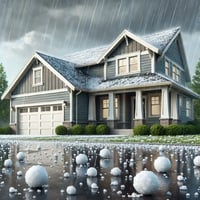Homeowners insurance policies offer important protection for your home’s structure, including...
How to Get Home Insurance to Pay for Your Air Conditioner
 Homeowners insurance can be confusing when it comes to covering air conditioners. Knowing if your policy covers HVAC systems helps you avoid unexpected expenses. This guide explains how standard home insurance applies to AC units, what optional equipment breakdown coverage can add, and how to file a claim if your AC unit is damaged by a covered event.
Homeowners insurance can be confusing when it comes to covering air conditioners. Knowing if your policy covers HVAC systems helps you avoid unexpected expenses. This guide explains how standard home insurance applies to AC units, what optional equipment breakdown coverage can add, and how to file a claim if your AC unit is damaged by a covered event.
Does Home Insurance Cover HVAC Units?
Yes, homeowners insurance often covers HVAC units, but only under certain conditions. Standard home insurance policies cover “sudden and accidental” damage caused by specific events, like fires or storms. But they won’t cover normal wear and tear or issues from poor maintenance. This means if your AC breaks down from age, your insurance won’t pay for repairs. However, if it’s damaged by a covered peril, your policy may help with the repair or replacement.
Covered Perils for HVAC Systems
Homeowners insurance usually covers certain perils that could damage an HVAC system. Some examples include:
- Fire or Lightning: If fire or lightning damages your air conditioner, homeowners insurance may cover it.
- Windstorm or Hail: If a storm damages your AC, your policy may pay for repairs or replacement.
- Theft or Vandalism: Your policy can cover repairs if someone vandalizes or steals your AC unit.
Check your policy to confirm which events (or “perils”) your insurance covers for HVAC systems.
Will Home Insurance Cover an AC Unit?
Whether your insurance covers your AC unit depends on its type and the cause of damage. Typically, central AC units fall under dwelling coverage, while window AC units may be covered as personal property.
Central AC Units vs. Window AC Units
- Central AC Units: Most home insurance policies consider central AC units as part of the home’s structure. They are usually covered under dwelling insurance, which protects built-in systems if a covered peril damages them.
- Window AC Units: Because window units aren’t permanently installed, they may be covered under personal property insurance. This type of coverage often has lower limits than dwelling coverage, so repair or replacement may be partially covered.
Talk to your insurance agent to see if your policy covers your AC unit as part of the home’s structure or as personal property.
What Situations Does Homeowners Insurance Cover for HVAC?
Homeowners insurance only covers HVAC units when sudden, accidental damage occurs from a covered peril. Your policy will not cover damage from regular wear and tear, poor maintenance, or age. This means if your AC stops working due to old age, you cannot file a claim.
Wear and Tear vs. Covered Damage
Insurance does not cover wear and tear, including:
- Age and Decline: If your AC unit stops working due to age, this counts as normal wear and tear.
- Poor Maintenance: If the AC unit fails because it wasn’t cleaned or serviced, this isn’t covered.
- Manufacturer Issues: Homeowners insurance also does not cover factory defects or improper installation.
If you’re looking to get insurance to pay for AC repair or replacement, the damage must be tied to a covered event like fire, wind, or vandalism. You cannot add coverage to protect an HVAC unit that’s already faulty.
Equipment Breakdown Coverage: An Optional Add-On
Equipment breakdown coverage is an optional add-on that covers repairs or replacements if major home appliances or systems, including HVAC units, break down due to mechanical or electrical issues. Unlike standard homeowners insurance, equipment breakdown coverage can help with repairs for specific AC problems not caused by wear and tear.
What Equipment Breakdown Coverage Covers
If your AC unit fails due to a mechanical issue, equipment breakdown insurance can help cover repairs or replacement. Here are some examples:
- Electrical Surges: If a surge damages your AC motor, equipment breakdown coverage could cover repairs.
- Mechanical Failures: Internal parts that fail may be covered by equipment breakdown coverage.
- Motor Burnout: If the motor burns out unexpectedly, equipment breakdown insurance might cover repair costs.
Equipment breakdown coverage doesn’t cover damage from general wear and tear or routine maintenance. However, it’s a helpful add-on for protecting your AC from sudden breakdowns that standard insurance won’t cover.
Cost and Availability
Adding equipment breakdown coverage is usually affordable, with only a small increase to your premium. Availability depends on your insurance provider, so ask your insurer if this option is available and what types of breakdowns it covers for your HVAC unit.
How to File a Claim for a Damaged AC Unit
If you need to file a claim due to damage from a covered peril, follow these steps to help ensure the process goes smoothly:
- Document the Damage: Take photos or videos of the damaged HVAC unit.
- Contact Your Insurance Agent: Report the damage and ask about coverage specifics.
- Gather Documentation: Collect maintenance records, receipts, and any documents related to the HVAC unit.
- File the Claim: Submit your claim with supporting documentation.
- Schedule an Inspection: Your insurance company may send an inspector to assess the damage.
If you also have equipment breakdown coverage, let your agent know to see if it applies to the type of damage.
Common Questions About AC Unit Coverage
Does Home Insurance Cover AC Units?
Yes, but only if damage is caused by a covered peril, like fire, theft, or vandalism. Window AC units may be covered as personal property, while central AC units fall under dwelling insurance.
Will Home Insurance Cover an AC Unit Replacement?
Homeowners insurance may cover replacement if a covered peril damages the unit, but it won’t replace an AC unit that fails due to age, wear, or lack of maintenance.
Can Equipment Breakdown Coverage Help?
Yes, equipment breakdown coverage can protect against sudden mechanical or electrical failures in your AC unit, but it won’t cover regular wear and tear or routine maintenance.
Tips to Protect Your AC Unit
While insurance can help with unexpected damage, you can extend your AC unit’s life with regular maintenance. Here are some ways to protect your HVAC system:
- Schedule Annual Maintenance: Have a professional service your AC at least once a year.
- Keep Surroundings Clear: Trim bushes and remove debris near your AC unit.
- Install Surge Protectors: Surge protectors can prevent electrical surges from damaging your unit.
Final Thoughts on Getting Home Insurance to Cover Your AC Unit
Homeowners insurance can cover HVAC systems if damaged by a covered peril, but it won’t cover normal wear, age, or maintenance issues. Equipment breakdown coverage may be a valuable addition to help with certain types of repairs not covered by standard insurance. For more details on your coverage, contact us at Harbor Insurance to discuss the best options for protecting your AC unit.



